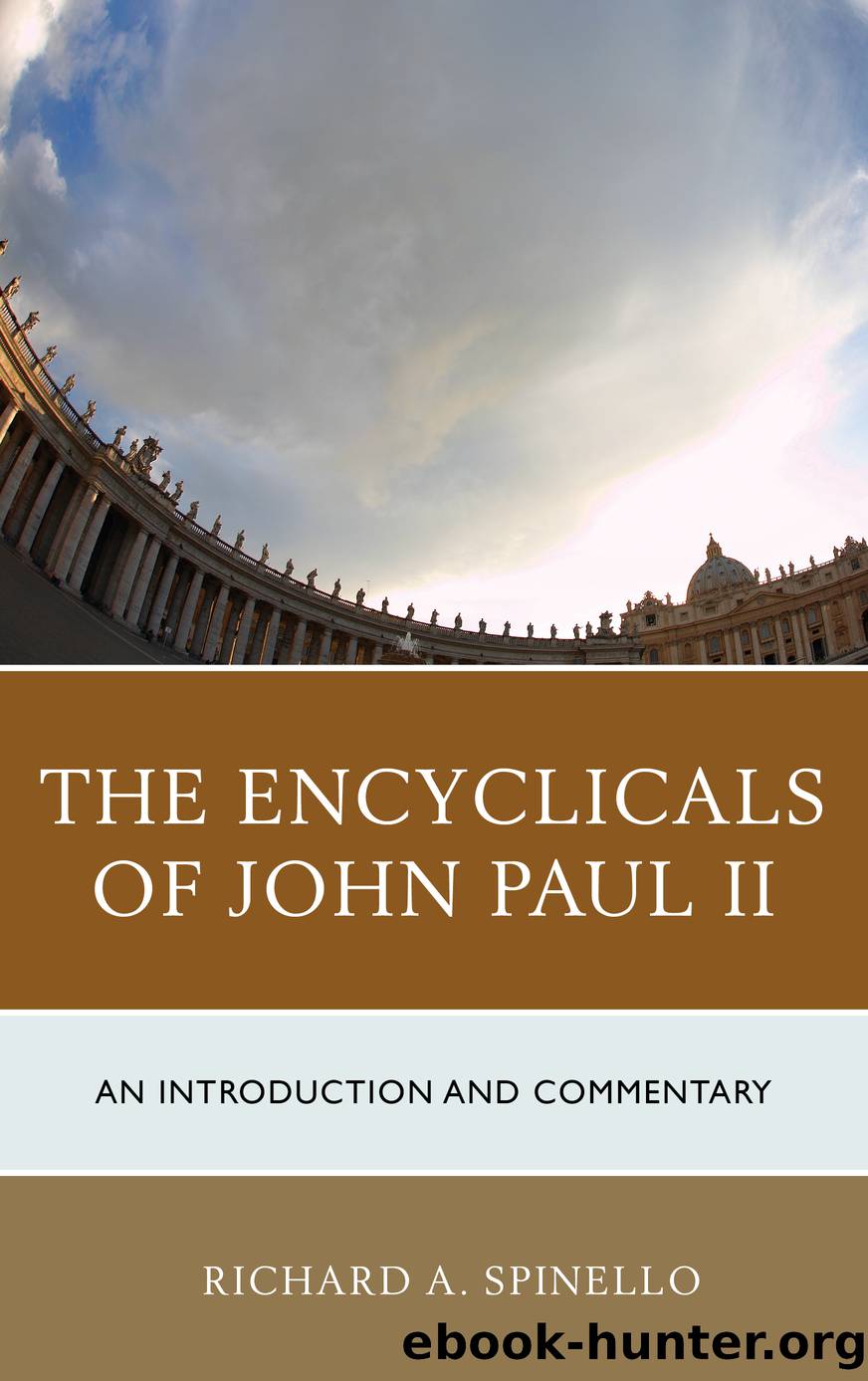The Encyclicals of John Paul II by Spinello Richard A.;

Author:Spinello, Richard A.;
Language: eng
Format: epub
Tags: undefined
Publisher: Rowman & Littlefield Publishers
Published: 2012-08-15T00:00:00+00:00
Social Concerns
John Paul II traveled almost 800,000 miles during his twenty-seven-year Pontificate. His first trip was not to Poland, as many people had expected, but to Mexico. After a short stay in Santo Domingo, he arrived in Mexico City on January 26, 1979. It was a typical winterâs day in Mexicoâwarm, clear, and still. Wildly enthusiastic crowds lined the streets of the Popeâs motorcade as he made his way from the airport to the cathedral. The Mexican people found the Pope to be refreshingly spontaneous during his papal addresses over the next few days. His buoyant optimism and pastoral sensibility captivated one audience after another.[11]
After his short stay in the capital John Paul II traveled to Puebla for a speech at the Latin American Bishopsâ Conference. With this speech John Paul II inserted himself into the contentious debate simmering in the Church over liberation theology. Liberation theologies, popular in Latin America at the time, interpreted the Gospel through Marxist categories, as they sought to persuade people to identify themselves according to their economic status. Liberation theologians proposed reading the Gospel from a âclass point of view,â in which Jesus is seen as the political liberator. Liberation is regarded in a secular sense, as liberation from economic servitude. Liberation theologians also put emphasis on sinful institutional structures that induce people to perpetrate injustices against the poor. According to Jon Sobrino, sin must be defined in terms of an unjust social structure âwhich deals death.â Thus, sinners include oligarchies, multinational corporations, various armed forces, and âvirtually every government.â[12]
In the Puebla speech the Pope spoke about the excesses of liberation theology. He reminded the bishops that Jesus ârejects recourse to violence . . . [and] opens his message of conversion to everybody,â including the rich.[13] He went on to declare that âthis idea of Christ as a political figure, a revolutionary, as the subversive man from Nazareth, does not tally with the Churchâs catechesis.â[14]
John Paul II addressed these same concerns in his second social encyclical, issued in 1987 and titled Sollicitudo Rei Socialis. Sollicitudoâs appearance marked the twentieth anniversary of Pope Paul VIâs Populorum Progressio, an encyclical with âenduring relevanceâ (SRS 2). In the opening sections John Paul II enunciates the encyclicalâs dual objective: to pay respect to this historic document of Paul VI and âto reaffirm the continuity of the social doctrine as well as its constant renewalâ (SRS 3).
In Chapter II (§ 5â10) the Pope praises Populorum Progressio for its originality on three main points: its emphasis on the ethical and cultural character of the problems associated with economic development (SRS 8); the encyclicalâs focus on âthe duty of solidarity,â which takes into account the interdependence between all nations (SRS 9); and the encyclicalâs concise prescription for world harmony summarized in its concluding paragraph: âDevelopment is the new name for peaceâ (SRS 10). Sollicitudo will contribute to the Churchâs reflections on development, a concept with âpermanent and contemporary valueâ (SRS 10).
Part III (§ 11â26) reviews whether has there been any genuine
Download
This site does not store any files on its server. We only index and link to content provided by other sites. Please contact the content providers to delete copyright contents if any and email us, we'll remove relevant links or contents immediately.
Joan of Arc by Mary Gordon(4099)
Victory over the Darkness by Neil T. Anderson(2859)
The Gnostic Gospels by Pagels Elaine(2527)
Devil, The by Almond Philip C(2324)
The Nativity by Geza Vermes(2226)
The Psychedelic Gospels: The Secret History of Hallucinogens in Christianity by Jerry B. Brown(2148)
Going Clear: Scientology, Hollywood, and the Prison of Belief by Lawrence Wright(1974)
Going Clear by Lawrence Wright(1962)
A TIME TO KEEP SILENCE by Patrick Leigh Fermor(1898)
Barking to the Choir by Gregory Boyle(1819)
Old Testament History by John H. Sailhamer(1809)
Augustine: Conversions to Confessions by Robin Lane Fox(1769)
A Prophet with Honor by William C. Martin(1717)
A History of the Franks by Gregory of Tours(1713)
The Bible Doesn't Say That by Dr. Joel M. Hoffman(1676)
The Knights Templar by Sean Martin(1651)
by Christianity & Islam(1627)
The Source by James A. Michener(1602)
The Amish by Steven M. Nolt(1562)
